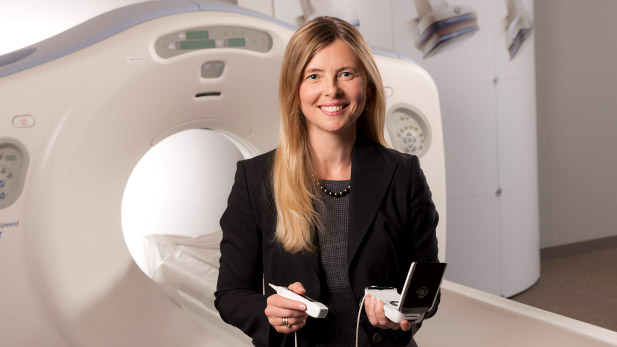Alumna Agnes Berzsenyi Puts Health Care in Women’s Hands

Agnes Berzsenyi, a 1995 master’s mechanical engineering graduate, is president and chief executive officer of GE Healthcare. She was named among America’s 100 “Women to Watch” in business this year by Bizwomen magazine.
Who best to design a medical device that’s putting women in control of their mammograms—potentially reducing breast cancer deaths—than a team of women engineers and scientists?
That’s why GE Healthcare encouraged a team of women in Paris, France, to develop the first patient-assisted 3D mammography device that allows women to fine tune their own breast compression during the exam. The device, Senographe Pristina, was approved for the marketplace this fall by the Federal Drug Administration.
“These women inspire me,” says GE Healthcare president and chief executive officer Agnes Berzsenyi, who earned a master’s degree in mechanical engineering from Rose-Hulman in 1995. “They were on a mission for all the women in their lives—and women all over the world—to make something special.”
In traditional mammography, the technologist performing the exam compresses the patient’s breast, often causing discomfort. Patient-assisted compression allows women to refine the application of compression to minimize the perceived pain and discomfort often associated with a mammogram. After the breast is properly positioned and compression is initiated by the technologist, the patient can use a remote control to adjust the compression paddle to her comfort level.
Senographe Pristina was designed with empathy in mind, according to Berzsenyi, with rounded edges and an image detector that is thinner than current systems. This allows for less cold metal to jab into the patient’s ribs and underarms—a common complaint from many women and technologists. Berzsenyi says that the system's potential to help increase the number of annual screening exams is a critical advancement in women's healthcare.
Studies reveal that one-in-eight women will develop invasive breast cancer in their lifetime, and that breast cancer is the second most common form of cancer in women, causing an average of 40,000 deaths annually across the U.S.
“As a woman, as a daughter, as a mother and as a friend, these statistics scare me. That’s why, at GE Healthcare, we asked women—not clinicians—why they avoid their mammograms,” says Berzsenyi.
She was shocked to learn that one-in-four women avoid recommended regular breast cancer screenings because of concerns and anxiety about the mammography experience.
“No woman should miss out on the potentially life-saving benefits of regular mammograms out of fear or anxiety of discomfort,” she said.
Currently, only 69 percent of women 45 years and older reported having a mammogram within the past two years, according to a National Health Interview Survey.
Berzsenyi has been part of GE Healthcare since 2007 and became president of the business unit earlier this year. She is a member of the GE Healthcare Women’s Network and was named among America’s 100 “Women to Watch” for 2017 in business by Bizwomen magazine.
“Working to develop technology like Senographe Pristina is why I love working at GE Healthcare. We get to help patients every day by designing technology that can help save lives,” she says.

